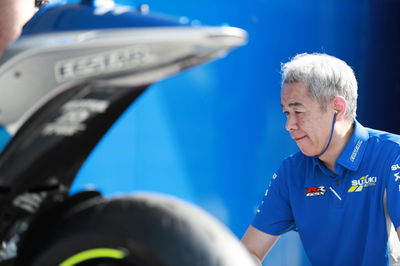Suzuki: No time for more MotoGP tests
Despite lengthy delays to the 2020 MotoGP season due to the coronavirus pandemic, some are calling for another test session to be arranged before racing eventually restarts.
Suzuki MotoGP project manager Shinichi Sahara is not among them.
With the sport expected to cull around half of this year's 20 rounds, the Japanese sees little point in wasting precious racing time by sending the premier-class to yet another standalone test, having already completed planned pre-season outings at Sepang and Losail.

Despite lengthy delays to the 2020 MotoGP season due to the coronavirus pandemic, some are calling for another test session to be arranged before racing eventually restarts.
Suzuki MotoGP project manager Shinichi Sahara is not among them.
With the sport expected to cull around half of this year's 20 rounds, the Japanese sees little point in wasting precious racing time by sending the premier-class to yet another standalone test, having already completed planned pre-season outings at Sepang and Losail.
“Now we are simply waiting for this pandemic to be over and for the world to recover, while Dorna is trying hard to reorganise the World Championship," Sahara said.
"I know some people were asking for another test before the season begins, and I can see the sense in that, but honestly speaking, the season is going to be too short as it is, so it would be better to just get started as soon as we can.
"Probably it would be good idea to have a test session or two on Thursday in the same week of the first race.
"It seems that we are going to have much less time to test this year because we may have to cancel the rest of the tests, but I’m sure we will find a way to make everything work!"
While the wait for clearance to go racing continues - a July or August start is currently seen as a best-case scenario - engine and aerodynamics were homologated remotely on March 25, rather than waiting for the unknown opening race.
The move was initiated on the grounds of fairness, since the European manufacturers were in shutdown conditions, while the Japanese factories were still able to operate as normal.
“The FIM decided, along with Dorna and IRTA, to freeze development [by issuing a 'remote' homologation deadline of March 25 for engine and aerodynamic design] to try and make the conditions fair for the European manufacturers, who are suffering more at the moment," Sahara confirmed.
"This is a good thing because it means we’re all in the same boat in terms of progress, and it creates a more level playing field.
"We left the sample of the engine that should be approved and homologated in Qatar, and we sent the aero-package drawings for homologation. We understand that we can’t develop, but we may have time to produce more pieces of parts which we found were positive during the winter test sessions.
“As a team we might also explore more opportunities to discuss deeply by telephone or web meetings what we need to do for the next step. We have a lot of ideas to improve [the bike], but even in the current situation, there is never enough time!
"In any case, with no riders on track it is always difficult to develop and everything moves much more slowly… [but] the idea is to try to continue with our development process, even if reduced, as best we can."
MotoGP rivals such as Maverick Vinales and Pol Espargaro have both named Suzuki as looking highly impressive during testing, with Alex Rins and Joan Mir not only quick over a single lap but more importantly during longer runs. However, such potential is so far unfulfilled.
“From a racing point of view it was a pity not to start in Qatar because we felt really ready to fight in the top group from the first race onwards, so I am a bit disappointed," Sahara admitted.
"But it’s the same for all the teams and riders and we have to accept it. Above all, the most important thing to focus on is the safety and the health of everyone, much more than racing."


![Toprak Razgatlioglu, ROKiT BMW Motorrad, BMW M 1000 RR [Gold & Goose]](https://cdn.crash.net/2024-09/GnG_1165424_HiRes.jpg?height=90)






![Johann Zarco, LCR, Honda RC213V, 2024 San Marino MotoGP, Misano, action [Gold & Goose]](https://cdn.crash.net/2024-09/GnG_1166323_HiRes.jpg?height=90)